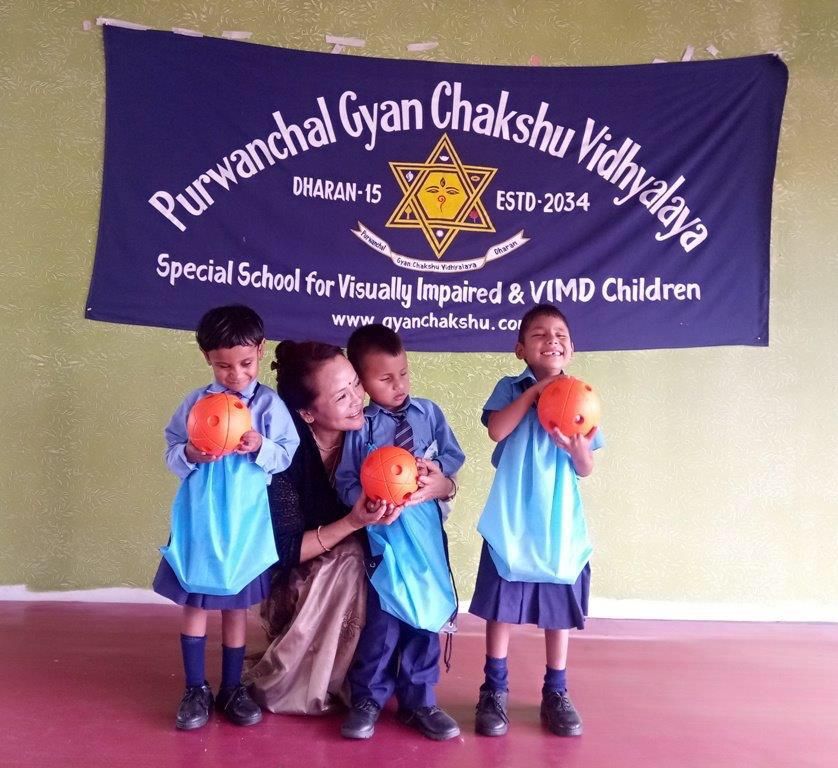 Liverpool is a city famous throughout the world, and a Catholic school is making sure the tradition continues in the field of specialist education.
Liverpool is a city famous throughout the world, and a Catholic school is making sure the tradition continues in the field of specialist education.
Dr John Patterson (pictured, left), Principal at St Vincent’s School, in the Archdiocese of Liverpool, has overseen pupils developing a disability sports toolbox that now helps children in 20 countries across four continents.
He has championed pupils’ leadership skills with an enriched curriculum which has them teaching their international peers in how to use the toolbox, and the Indonesian government has since asked for 70,000 of its social workers to be similarly trained.
The school's pupils have made ceramic Remembrance poppies worn by leaders including then-Prime Minister Theresa May; they have sung for the Queen; and have also been featured in an exhibition by celebrity photographer Rankin for the COP26 climate change summit that took place in Glasgow during 2021.
So how did a lad in oil-stained overalls end up empowering a generation of visually-impaired (VI) young people, both in Britain and beyond?
Innovating education
John Patterson originally started out as an engineer more than 30 years ago, when his mother supported him to retrain as a teacher at Liverpool Hope, one of four Catholic universities in England. Working in inner city primary schools, he soon designed activities linking sports with technology, eventually returning to Liverpool Hope as Head of PE in teacher training and education.
During this time he completed a Master’s degree and PhD and was then asked by the government to set up a free school, at which he was appointed headteacher. In 2012 Dr Patterson became Principal of St Vincent’s School.
“When the Holy Father calls for the reaching of the marginalised we couldn’t really be reaching a more marginalised group than the visually impaired,” he said, adding that the unemployment rate for adults with visual impairments is around 85%, while they have on average five or six fewer friends than sighted people, contributing to isolation, health and wellbeing issues.
As Principal, Dr Patterson set about encouraging students’ entrepreneurialism, employment skills, creativity, and solidarity with those less fortunate. On Wednesdays pupils choose lessons they feel play to their strengths, including in music, drama, sports, ICT, environmental work, and growing food on the school grounds to use in a student-run café.
“Our Lord asked blind Bartimaeus what he wanted, He didn’t presume,” Dr Patterson said, “So for me it’s a big part of following His lead, giving both voice and choice.”
From the Mersey to the world
At the same time he has made use of an extensive network of contacts built up in the city over the years to open up new opportunities for the school.
Pupils have designed computer games and given presentations to major employers including Capita and cereal producer Kellogg’s, which led to VI-accessible information being added to packaging. An essay on the theme of peace, part of citizenship learning, led to a pupil travelling to New York through Liverpool Lions Club to read out his prize-winning entry at the United Nations headquarters.
“It’s a real encouragement to have their voices heard and included, where so often they’re overlooked,” Dr Patterson said.
When pupils learned how little equipment VI children in developing countries have, they resolved to help address the situation. With support from Liverpool Hope and John Moores universities they devised the Sightbox, containers of items to assist blind and VI children participating in sport, such as gym kits, a boccia grid and balls, a goalball, pedometer, digital talking watch, and card games in braille.
Through Liverpool Rotary Club Sightboxes have now been delivered to VI schools worldwide including in Pakistan, Uganda, Ethiopia, Peru, the Virgin Islands, Indonesia and many more including in Nepal (see image below) .

Rotary representatives say the children are much more independent and confident when they have visited a year after first delivering the Sightboxes. The initiative has been recognised by the Royal National Institute of Blind People, and St Vincent’s also sends prescription glasses to children in poorer countries whose eyesight is at risk due to albinism.
The school’s achievements came to the attention of Cardinal Michael Fitzgerald M. Afr. OBE, who was so impressed that he invited the pupils to present their international work at an interfaith forum attended by elders from local mosques and the Lord-Lieutenant of Merseyside, Mark Blundell.
Cardinal Fitzgerald has since invited the Society of Missionaries of Africa, into which he was ordained in 1961, to partner with the school.
As part of celebrations last year to mark the 250th anniversary of Amazing Grace, St Vincent’s pupils sang at St Peter and St Paul, at Olney, near Milton Keynes. This was the parish church of the hymn’s composer, the Revd John Newton, at which the school had been invited to participate in an event organised by the nearby Cowper and Newton Museum.
Leadership
These activities count towards the Duke of Edinburgh’s (DofE) Award, and some of the students have gone on to secure their Gold DofE and play for England VI teams. The school hosts the mandatory VI teacher training programme with John Moores University, while sighted students from elsewhere in the region are taught by St Vincent’s pupils in how to play disability sports, a concept of ‘reverse inclusion’ to promote leadership.
The success of the school has not gone unnoticed, and Dr Patterson won the Silver Lifetime Achievement category at the Pearson National Teaching Awards 2023 and has been granted the Freedom of the City of Liverpool. He has also written a book on VI for Redemptorist Publications, and contributed to a collection of essays celebrating the life-changing impact of Liverpool Hope University, launched at Lambeth Palace Library.
The city’s Regional Combined Authority has affirmed a task force to assist Dr Patterson in delivering international collaborations, emphasising the contribution of Liverpool to the UK economy and drawing research and development funding to the area.
He said: “It’s all part of our school’s enriched curriculum, to enable, empower and signpost pupils into opportunity and employability, and helping other VI pupils globally, it’s what our pupils wanted to do.
“We’re not blind — we’ve got vision.”
St Vincent’s School was established on its present site in 1901 by the Daughters of Charity of St Vincent de Paul. It is part of the Catholic Blind Institute and is consistently rated by Ofsted as outstanding.

